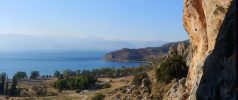
N 37°01'54.0"
E 22°49'37.8"
That day I wanted to cross the mountains.
Not high. Separating the central part of the Peloponnese from the eastern coast. It was in the second week of my journey around the great, mulberry-leaf shaped, Greek peninsula. I had over 1000 km in my legs, countless bays and sea views under my eyelids, the memory of a few Venetian forts and many old towns, located on such steep slopes that some houses grow on the roofs of others. I was constantly reliving the endless serpentine roads and all the shades of sunrises and sunsets that I saw every day. I thought that little could surprise me anymore.
Peloponnese

READ MORE
The map showed two possible routes: the more northern one I used to drive by car, the southern one seemed much less traveled, because almost all of it was marked in yellow. I knew nothing about it. I am a bit depressed by such choices. After all, we can always choose only one option and a piece of the world is always missing.
In Vlachiotis, near the coast of the Laconian Gulf, I bought my last coffee and a bugkatza (a sweet Greek morning cake). Inland, I wasn’t expecting such a delicacy anymore. It was mid-November, Greece had a strict lockdown, all taverns closed, and some supply problems. After a few hours I was going the long, wide valley of Vathia Chouni with the river dry at this time. The road rose gently, the driveway was not difficult, no car had passed me in more than an hour. At the beginning, I was surrounded by groves of mandarins and oranges that were just ripening, above mainly olive trees and dry thickets. The world seemed so beautiful and gentle; after all, I was already in Arcadia, so maybe the name is obliging.

Blade Runner soundtrack
Lights of Los Angeles. Frame from Blade Runner. Directed by Ridley Scott, 1982.
Phaistos Disk

READ MORE
Deckard is talking to the machine
It may be worth recalling that Blade Runner is considered one of the best sci-fi movies, and maybe even one of the greatest films in the history of cinema. It also has a great soundtrack, Vangelis’ music is certainly one of his greatest achievements. I had the first version* of the soundtrack at my disposal, released 12 years after the film was made. It’s a short version, containing only the most important songs, but like in other editions, there are also fragments of dialogues. I know it by heart, but the very first sounds made me dumbfounded. The synthesizer background clearly indicated – we are in a different world. Like me at that moment, completely outside of civilization, in a place rarely haunted by anyone, in November with a lockdown – completely extinct. Against this background, Deckard – the main character – is talking to the machine. He tries to recognize the sign of one of the replicants – his future victim, on the increasing magnification of the accidental photo. As in many parts of the movie, everything is done in slow motion. Decker speaks slowly, as if wondering or rather paying close attention to what he sees. Or maybe it was also about the “machine” being able to answer him, emitting characteristic electronic sequences of squeaks and whistles. For us, there is also an (unintended) humorous element. Finally, Deckard asks to make a paper copy.

Blush Response
Still from Blade Runner. Tyrell Corporation interior, where Deckard first met Rachel. The film features the interiors of at least three famous Los Angeles buildings: Ennis House, Bradbury Building, and Union Station.
Seal Of Pylos
Forgotten Masterpiece

READ MORE

Mari and Tales of the Future
I was still going up the Vathia Chouni valley but I felt more and more like I was in a movie theater. Vangelis’ music had this extraordinary power to evoke images of futuristic Los Angeles, even somewhere in the eastern Peloponnese. There were still no cars, human settlements or even single houses, but the name Mari appeared more and more often on road signs. I didn’t know what to expect there, but the very sound of the name “Mari” had some kind of magic and attracted me a lot. Perhaps it is not by accident that you are going to some Mari while listening to Vangelis in the Peloponnese? Or… maybe it is because of Mari that you think to start listening to Blade Runner music in the middle of nowhere?
After the next few kilometers, my intuition of Blade Runner’s “operability” found another confirmation. The album features a fragment of “Tales of the Future” with the vocal part of Vangelis’ friend – Demis Roussos. Fans and critics of the movie went to great lengths to read what Demis sings about, or at least in what language he does it. Unsuccessfully. His vocals sound a bit like Arabic or Coptic phrases, because Demis Rousos was born and raised in the Greek diaspora in Cairo. In practice, however, it is not a language. Or is it the title language of the future, not yet defined but already present in the minds of its creators and revealed to us by Roussos? Anyway, in the lexical layer it remains incomprehensible, in the layer of emotions conveyed and matching to the images on the screen – it rises to the heights. It perfectly co-creates what is most important in this film: multi-level, hidden meanings, a sense of mystery, asking questions rather than giving simple answers, influencing through the image and sound of music more than with the statements of the characters.

Rutger Hauer monologue
I was just passing the village of Mari when Rutger Hauer was starting his monologue, the most important in the whole film: “I’ve seen things, you people wouldn’t believe …” I write Rutger Hauer, not Roy Betty (film character), because the monologue is partly written by Hauer, and the actor identified with it so much that he often recalled this moment for the rest of his life. It’s raining in the movie (which is crucial for this scene), and of course the sun was shining for me. Mari turned out to be a beautiful, tiny settlement with individual houses scattered on the slopes of the valley. It looked almost deserted, especially since many houses were overgrown with green grass and thick brush. As in many other places along the way, I did not meet anyone there. Mari was charming, but not much more than other villages in the Peloponnese. Quite average delight.
This key scene for Blade Runner is actually quite unexpected and surprising. Here Betty, instead of killing Deckard, saves his life and reveals the greatest truth about the human condition:
I've seen things, you people wouldn't believe,
... attack ships on fire off the shoulder of Orion.
I've watched C-beams glitter in the dark near the Tannhauser Gate.
All those moments, will be lost in time like tears in rain ...
Roy Betty just moments before his death. Still from Blade Runner.
world in memory
A kind of terror overwhelmed me. It started to seem like Roy Betty was talking to me, or rather about me! I have not seen a space fighters attack anywhere in the Orion Belt, nor have I ever been to the Tannhauser Gate, but on my journey around the Peloponnese I saw things that most people had not dreamed of and that I would not have believed myself before. And like Betty, it wasn’t about the present moment, but about the world in memory. As if the density of impressions did not allow us to fully appreciate them at present, and only later could they return in the images of memory, when nothing apparently happened around. The journey would therefore be a kind of gathering of images stored right under the eyelids that must come back in close memory for them to be fully appreciated.
The mystical temple landscape in Delphi, the idyllic atmosphere of Nafpaktos/Lepanto, which I fully understood much later, the industrial orgy of steel structures on the huge bridge hanging next to Patra, endless roads along the beaches in the western Peloponnese, Navarino Bay where I tried to photograph the sun for two hours, the mighty Venetian fortress of Methoni reflecting the gray stones of the walls in the blue of the sea, four days of exploring the forgotten mountains of Taygetos around Kardamili, utter visual madness of Cape Tenaro at the southern end of Europe with an overnight stay on the beach right next to the entrance to Hades; Mani – as a whole, a land of myth and still beautiful contemporary and Githio – attached to a vertical slope by the sea, where from the window of the hotel room I was looking at the island of Cranae, where Paris and Helen spent their first night together… I had all these images before my eyes when Betty was uttering his immortal last sentence: “All those moments, will be lost in time like tears in rain.” Not very optimistic, but probably largely true. But maybe not everything is lost and some fragments of our life can be saved from oblivion? Especially when you are in some Mari – in the middle of nowhere – which has the magical power to restore memories, if only because it creates space for them.

in the middle of nowhere


Rovigo is a small town in the northern part of Italy, in the Po plain, situated on the Ferrara-Padua railway line. Now immortal because Zbigniew Herbert called Rovigo one of the volumes of his poems. Babadag, on the other hand, is located in southern Romania, somewhere between the Danube Delta and Constanta. It became more known when Andrzej Stasiuk entitled On the road to Babadag his most famous tome of traveling prose. It just so happens that I’ve been to both of these cities once. Indeed, there is nothing there. Of course, relatively nothing compared to the reality all around swelling with attractions. Mari is not really like them, much smaller and much more… romantic. However, they all have one thing in common: a magical-sounding name. Rovigo, Babadag, Mari – banal places that allow you to appreciate what is completely original. Also wonderfully opening to future experiences, especially if we use Vangelis’ music as a catalyst.
is Deckard an Android?
Of the several versions of the Blade Runner ending, the ambiguous one I like best. Deckard and Rachel get in the elevator and disappear from the frame. The camera briefly shows a paper unicorn figurine with orgies, which may indicate that Deckard is also Android, but our heroes don’t see it anymore. Nothing is a foregone conclusion, it is not known whether they will manage to escape, it is not known who they are and how much time they have left. The closing credits and the last, long music sequence appear. Again, this is a flight theme, because virtually all of Vangelis’ music for Blade Runner is a flight, movement and displacement theme. It is probably mainly about spaceships and flying police cars, but it turns out that it is also great for cycling. Maybe that’s why, then, several kilometers before Mari, I just pressed this PLAY button.
Unicorn drawing by Lora Zombie Studio

MORE POSTS ABOUT PELOPONNESE
Peloponnese by Bike
With some running in Taygetos
Seal of Pylos
Calypso Deep
The deepest place in the entire Mediterranean Sea


